A+ Grades
Welcome All to this page.
Here you will find ; ALL DOCUMENTS, PACKAGE DEALS, FLASHCARDS AND 100% REVISED & CORRECT STUDY MATERIALS GUARANTEED A+.
NB: ALWAYS WRITE A GOOD REVIEW WHEN YOU BUY MY DOCUMENTS.
ALSO, REFER YOUR COLLEGUES TO MY DOCUMENTS. ( Refer 3 and get 1 free document).
I AM AVAILABLE TO SERVE YOU AT ANY TIME.
WISHING YOU SUCCESS IN YOUR STUDIES.
THANK YOU.
- 2357
- 0
- 194
Community
- Followers
- Following
1 Reviews received
2556 items
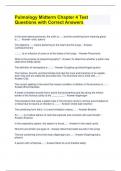
Pulmology Midterm Chapter 4 Test Questions with Correct Answers
Pulmology Midterm Chapter 4 Test Questions with Correct Answers In the word adenocarcinoma, the suffix is ..... and the combining form meaning gland is..... - Answer--oma, aden/o The adjective ..... means pertaining to the heart and the lungs. - AnswerCardiopulmonary .......... Is an infection of some or all the lobes of the lungs. - Answer-Pneumonia What is the purpose of polysomnography? - Answer-To determine whether a potion has obstructive sleep apnea The definition of hemoptysis i...
- Package deal
- Exam (elaborations)
- • 2 pages •
Pulmology Midterm Chapter 4 Test Questions with Correct Answers In the word adenocarcinoma, the suffix is ..... and the combining form meaning gland is..... - Answer--oma, aden/o The adjective ..... means pertaining to the heart and the lungs. - AnswerCardiopulmonary .......... Is an infection of some or all the lobes of the lungs. - Answer-Pneumonia What is the purpose of polysomnography? - Answer-To determine whether a potion has obstructive sleep apnea The definition of hemoptysis i...
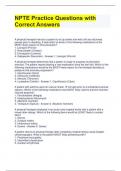
Bundle For NPTE Practice Exam Questions and Answers All Correct
1 Exam (elaborations) NPTE Exam Questions with Correct Answers 2 Exam (elaborations) NPTE Practice Questions with Correct Answers 3 Exam (elaborations) NPTE Test Questions with Correct Answers 4 Exam (elaborations) NPTE Exam Prep Questions with Correct Answers 5 Exam (elaborations) NPTE Iontophoresis Test Questions and Answers
- Package deal
- • 13 items •
- NPTE Final Frontier Exam Questions with Correct Answers • Exam (elaborations)
- NPTE Practice Exam Questions and Answers All Correct • Exam (elaborations)
- NPTE Outcome Measures Test Questions with Correct Answers • Exam (elaborations)
- NPTE Prosthetics Exam Questions with Correct Answers • Exam (elaborations)
- Neuro NPTE Exam Questions with Correct Answers • Exam (elaborations)
- And more ….
1 Exam (elaborations) NPTE Exam Questions with Correct Answers 2 Exam (elaborations) NPTE Practice Questions with Correct Answers 3 Exam (elaborations) NPTE Test Questions with Correct Answers 4 Exam (elaborations) NPTE Exam Prep Questions with Correct Answers 5 Exam (elaborations) NPTE Iontophoresis Test Questions and Answers
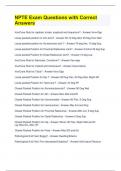
NPTE Exam Questions with Correct Answers
NPTE Exam Questions with Correct Answers Vex/Cave Rule for capitate, lunate, scaphoid and triquetrum? - Answer-Vex=Opp Loose packed position for GH Joint? - Answer-50-70 Deg Abd, 35 Deg Horz Abd Loose packed position for Humeroulnar joint ? - Answer-70 deg flex, 10 deg Sup Loose packed Position for Proximal Radioulnar Joint? - Answer-Full Ext 35 deg Sup Loose packed Position for Distal Radioulnar Joint? - Answer-10 deg sup Vex/Cave Rule for Navicular, Cuneiform? - Answer-Vex=opp Vex/Ca...
- Exam (elaborations)
- • 59 pages •
NPTE Exam Questions with Correct Answers Vex/Cave Rule for capitate, lunate, scaphoid and triquetrum? - Answer-Vex=Opp Loose packed position for GH Joint? - Answer-50-70 Deg Abd, 35 Deg Horz Abd Loose packed position for Humeroulnar joint ? - Answer-70 deg flex, 10 deg Sup Loose packed Position for Proximal Radioulnar Joint? - Answer-Full Ext 35 deg Sup Loose packed Position for Distal Radioulnar Joint? - Answer-10 deg sup Vex/Cave Rule for Navicular, Cuneiform? - Answer-Vex=opp Vex/Ca...

NPTE Practice Questions with Correct Answers
NPTE Practice Questions with Correct Answers A physical therapist instructs a patient to sit up slowly and wait until any dizziness passes prior to standing. A side effect of which of the following medications is the MOST likely reason for this precaution? 1. Lisinopril (Prinivil) 2. Rosuvastatin (Crestor) 3. Enoxaparin (Lovenox) 4. Gabapentin (Neurontin) - Answer-1. Lisinopril (Prinivil) A physical therapist determines that a patient is ready to progress to plyometric exercise. The ...
- Package deal
- Exam (elaborations)
- • 10 pages •
NPTE Practice Questions with Correct Answers A physical therapist instructs a patient to sit up slowly and wait until any dizziness passes prior to standing. A side effect of which of the following medications is the MOST likely reason for this precaution? 1. Lisinopril (Prinivil) 2. Rosuvastatin (Crestor) 3. Enoxaparin (Lovenox) 4. Gabapentin (Neurontin) - Answer-1. Lisinopril (Prinivil) A physical therapist determines that a patient is ready to progress to plyometric exercise. The ...
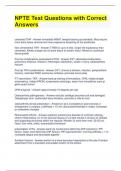
NPTE Test Questions with Correct Answers
NPTE Test Questions with Correct Answers cemented THR - Answer-Immediate WBAT (weight bearing as tolerated). May require more bone tissue removal and may experience loosening of the prosthesis Non cementental THR - Answer-TTWB for up to 6 wks. longer life expectancy than cemented. Allows a larger amt of bone tissue to remain intact. Allows for continued tissue growth Post op complications associated w/THR - Answer-DVT, dislocation/subluxation, pulmonary embolus, infection, heterotopic ...
- Package deal
- Exam (elaborations)
- • 4 pages •
NPTE Test Questions with Correct Answers cemented THR - Answer-Immediate WBAT (weight bearing as tolerated). May require more bone tissue removal and may experience loosening of the prosthesis Non cementental THR - Answer-TTWB for up to 6 wks. longer life expectancy than cemented. Allows a larger amt of bone tissue to remain intact. Allows for continued tissue growth Post op complications associated w/THR - Answer-DVT, dislocation/subluxation, pulmonary embolus, infection, heterotopic ...
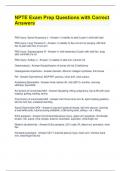
NPTE Exam Prep Questions with Correct Answers
NPTE Exam Prep Questions with Correct Answers PNS injury: Spinal Accessory n - Answer-1) inability to abd 2) pain in shld with abd PNS injury: Long Thoracic N - Answer-1) inability to flex ext arm 2) winging >90 fwrd flex 3) pain with flex of ext arm PNS Injury: Suprascapular N - Answer-1) shld weakness 2) pain with shld flex, scap abd, contralat c/s rot PNS Injury: Axillary n - Answer-1) inability to abd arm (neutral rot) Osteomalacia - Answer-Decalcification of bones d/t vita D de...
- Package deal
- Exam (elaborations)
- • 21 pages •
NPTE Exam Prep Questions with Correct Answers PNS injury: Spinal Accessory n - Answer-1) inability to abd 2) pain in shld with abd PNS injury: Long Thoracic N - Answer-1) inability to flex ext arm 2) winging >90 fwrd flex 3) pain with flex of ext arm PNS Injury: Suprascapular N - Answer-1) shld weakness 2) pain with shld flex, scap abd, contralat c/s rot PNS Injury: Axillary n - Answer-1) inability to abd arm (neutral rot) Osteomalacia - Answer-Decalcification of bones d/t vita D de...
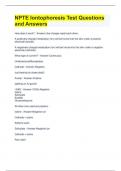
NPTE Iontophoresis Test Questions and Answers
NPTE Iontophoresis Test Questions and Answers How does it work? - Answer-Like charges repel each other. A positively charged medication (ion) will be forced into the skin under a positive electrode (anode). A negatively charged medication (ion) will be forced into the skin under a negative electrode (cathode). What type of current? - Answer-Continuous Unidirectional/Monophasic Cathode - Answer-Negative (cat bearing its claws=bad!) Anode - Answer-Positive (getting an A=good!) I SAD...
- Package deal
- Exam (elaborations)
- • 3 pages •
NPTE Iontophoresis Test Questions and Answers How does it work? - Answer-Like charges repel each other. A positively charged medication (ion) will be forced into the skin under a positive electrode (anode). A negatively charged medication (ion) will be forced into the skin under a negative electrode (cathode). What type of current? - Answer-Continuous Unidirectional/Monophasic Cathode - Answer-Negative (cat bearing its claws=bad!) Anode - Answer-Positive (getting an A=good!) I SAD...
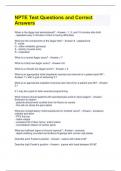
NPTE Test Questions and Correct Answers
NPTE Test Questions and Correct Answers When is the Apgar test administered? - Answer-- 1, 5, and 10 minutes after birth. - repeated every 5 minutes if infant is having difficulties What are the components of the Apgar test? - Answer-A - appearance P - pulse G - reflex irritability (grimace) A - activity (muscle tone) R - respiration What is a normal Apgar score? - Answer-> 7 What is a fairly low Apgar score? - Answer-4-6 What is a critically low Apgar score? - Answer-< 3 Wha...
- Package deal
- Exam (elaborations)
- • 9 pages •
NPTE Test Questions and Correct Answers When is the Apgar test administered? - Answer-- 1, 5, and 10 minutes after birth. - repeated every 5 minutes if infant is having difficulties What are the components of the Apgar test? - Answer-A - appearance P - pulse G - reflex irritability (grimace) A - activity (muscle tone) R - respiration What is a normal Apgar score? - Answer-> 7 What is a fairly low Apgar score? - Answer-4-6 What is a critically low Apgar score? - Answer-< 3 Wha...
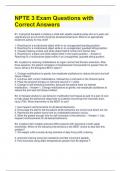
NPTE 3 Exam Questions with Correct Answers
NPTE 3 Exam Questions with Correct Answers B1. A physical therapist is treating a child with spastic cerebral palsy who is 3 years old cognitively but at a 6-month-old gross developmental level. What is an appropriate treatment activity for this child? 1. Reaching for a multicolored object while in an unsupported standing position. 2. Reaching for a multicolored object while in an unsupported, guarded sitting position. 3. Visually tracking a black and white object held 9 inches from his...
- Exam (elaborations)
- • 48 pages •
NPTE 3 Exam Questions with Correct Answers B1. A physical therapist is treating a child with spastic cerebral palsy who is 3 years old cognitively but at a 6-month-old gross developmental level. What is an appropriate treatment activity for this child? 1. Reaching for a multicolored object while in an unsupported standing position. 2. Reaching for a multicolored object while in an unsupported, guarded sitting position. 3. Visually tracking a black and white object held 9 inches from his...
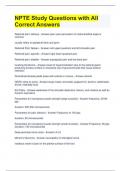
NPTE Study Questions with All Correct Answers
NPTE Study Questions with All Correct Answers Referred pain: kidneys - Answer-pain upon percussion of costovertebral angle is common usually refers to ipsilateral flank and groin Referred Pain: Spleen - Answer-Left upper quadrant and left shoulder pain Referred pain: apendix - Answer-right lower quadrant pain Referred pain: bladder - Answer-suprapubic pain and low back pain Cushing Syndrome - Answer-result of hypercortisolism due to the adrenal gland producing excess cortisol or exces...
- Package deal
- Exam (elaborations)
- • 7 pages •
NPTE Study Questions with All Correct Answers Referred pain: kidneys - Answer-pain upon percussion of costovertebral angle is common usually refers to ipsilateral flank and groin Referred Pain: Spleen - Answer-Left upper quadrant and left shoulder pain Referred pain: apendix - Answer-right lower quadrant pain Referred pain: bladder - Answer-suprapubic pain and low back pain Cushing Syndrome - Answer-result of hypercortisolism due to the adrenal gland producing excess cortisol or exces...

NRNP 6550 Midterm EXAM LATEST 2023 /NRNP6552 WEEK 6 MIDTERM 100 QUESTIONS AND ANSWERS| VERIFIED ANSWERS